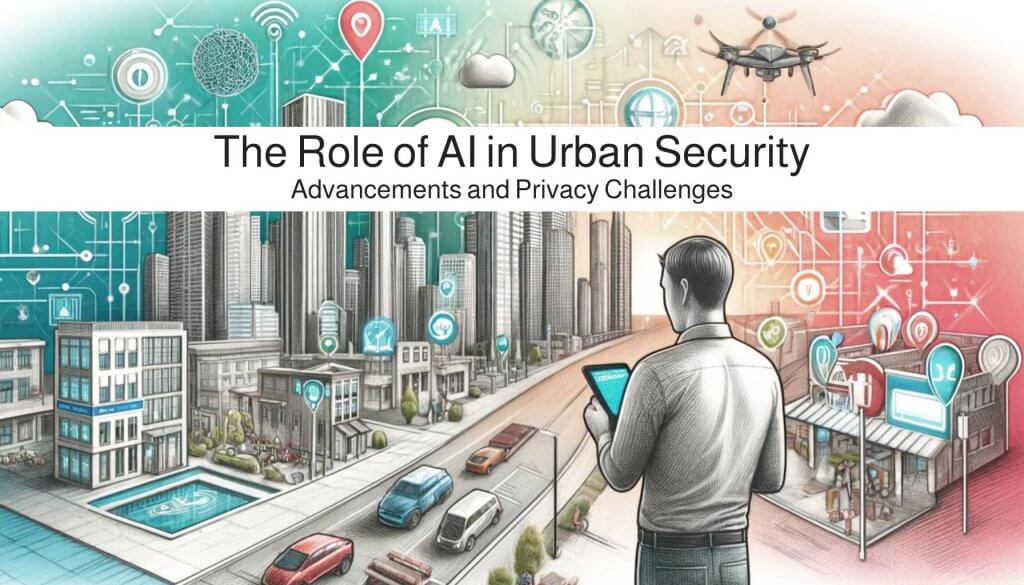Cities everywhere are turning to artificial intelligence (AI) to improve urban security. From smart surveillance systems to predictive tools, AI helps prevent crime and keep people safe. But while this technology shows great promise, it also raises big questions about privacy, consent, and ethics. Let’s explore how privacy concerns are shaping the future of urban security and what this means for modern city life.

How AI is Changing Urban Security
AI has brought incredible changes to how cities manage security. These tools can monitor large areas in real-time and even predict potential threats.
1. Smarter Surveillance Systems
AI-powered surveillance goes beyond traditional cameras. Tools like facial recognition and motion detection can spot risks quickly. These systems work nonstop to monitor public spaces, helping catch problems before they escalate.
2. Predictive Policing
By analyzing past crime data, AI can identify areas at higher risk for crimes. Cities like Los Angeles and Chicago already use this technology to plan patrols and allocate resources, stopping crimes before they happen.
3. Emergency Management
In natural disasters or emergencies, AI helps guide decisions. It can process data from weather patterns, sensors, and crowds to coordinate evacuations and send help where it’s needed most.
These advancements make cities safer, but they also raise concerns about personal freedom.
Privacy Concerns in AI-Driven Surveillance
AI security systems come with a trade-off: they collect huge amounts of personal data. Many people don’t even realize they’re being monitored.
1. Tracking Without Consent
AI tools often track people in public spaces without their knowledge. Cameras and sensors quietly collect data, raising questions about consent and transparency.
2. Risks of Data Misuse
The data collected is a prime target for hackers. Breaches can expose sensitive information, like facial profiles and movement patterns. In some cases, authorities could misuse the data to silence opposition.
3. Bias in AI Systems
AI tools aren’t perfect. Many systems show bias because they’re trained on flawed data. For example, facial recognition software often struggles to identify darker skin tones. This can lead to unfair outcomes and loss of trust.
According to PIA’s blog post, cities face tough challenges in balancing the benefits of surveillance with the need to protect privacy.
Shaping Urban Surveillance with Privacy in Mind
Awareness about privacy risks is growing, and it’s changing how governments and companies approach surveillance. New tech and policies aim to protect personal data while keeping cities safe.
1. Privacy-Focused Innovations
Developers are working on tools that protect privacy, such as systems that blur faces or process data locally instead of storing it centrally. These methods reduce the risk of leaks or misuse.
2. Stronger Laws
Governments are creating stricter rules for data collection. The EU’s GDPR, for example, requires companies to be clear about how they use personal data. These regulations set a high bar for accountability.
3. Involving the Public
Cities are starting to involve their citizens in decisions about surveillance. Public consultations and open discussions build trust and make the process more transparent.
Challenges in Finding the Right Balance
Balancing safety and privacy isn’t easy. There are several hurdles to overcome:
1. Defining Limits
What’s acceptable surveillance? Different places have different answers. Policymakers must work with communities to draw clear lines.
2. Building Public Trust
Without clear communication, people may lose trust in surveillance systems. Cities need to be open about how they collect and use data.
3. Preventing Overreach
AI technology is powerful, but it needs limits. Without strict rules, cities risk becoming overly monitored, which can harm individual freedoms.
Citizens’ Role in Shaping Security
People have a huge role in influencing how surveillance evolves. By speaking up, they can ensure that security measures respect their rights.
1. Push for Transparency
Citizens should demand clear answers about how surveillance works. Regular updates and audits can hold authorities accountable.
2. Support Ethical AI
Community groups and activists can advocate for AI systems that are fair and free of bias. These voices are crucial in ensuring privacy is prioritized.
3. Join Policy Discussions
Being part of conversations about security policies can make a big difference. When citizens get involved, their perspectives help shape fairer solutions.
The Importance of Ethical AI Development
Ethical AI development is crucial for ensuring urban security systems respect individual rights. Without ethical practices, even the most advanced technologies can cause harm.
1. Designing for Fairness
Developers must prioritize fairness when creating AI systems. This means addressing biases in training data and ensuring algorithms treat everyone equally.
2. Ensuring Accountability
AI systems must be transparent and accountable. Developers should be able to explain how decisions are made, especially in high-stakes scenarios like law enforcement.
3. Prioritizing Privacy
Ethical AI should minimize data collection and use privacy-enhancing techniques. By designing systems with privacy in mind, developers can reduce risks while maintaining security.
Focusing on ethical AI ensures that urban security systems serve the public good without compromising individual freedoms.
Conclusion
AI is transforming urban security, offering tools to make cities safer and smarter. But these advancements come with real risks to privacy. Striking the right balance between safety and individual rights requires teamwork between governments, companies, and citizens.
Addressing privacy concerns is essential for using surveillance technologies responsibly. By focusing on transparency and ethics, cities can create security systems that protect both people and their freedoms.
The future of urban security depends not just on technology but on how we choose to use it. By working together, we can build cities that are both safe and respectful of privacy.